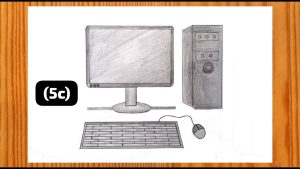
NECO DATA PROCESSING ANSWERS
======================================================
INSTRUCTIONS: Answer four (4) questions only
======================================================
(1a)
A data model is a conceptual representation of data, their relationships, and properties, used to design a database system. It defines the structure, organization, and format of the data that is stored, processed, and accessed within a database system.
(1bi)
Worksheet: A worksheet is an electronic document used to store and organize data in a structured manner on a single page. It consists of columns and rows which together make up a grid of cells. Each cell can contain a single piece of data.
*WHILE*
Workbook: A workbook is a collection of worksheets that share a common theme or purpose. All the worksheets in a workbook are stored in a single file and each worksheet can be accessed independently and edited without affecting the other worksheets.
(1bii)
Cell: A cell is a single box in a worksheet that contains either a value or a formula. Cells are organized into columns and rows and are referenced by their column and row labels.
*WHILE*
Active Cell: The active cell is the cell that is currently selected in a worksheet. The active cell is highlighted and all actions performed in the worksheet will be applied to this cell until another cell is selected.
(1ci)
Bookmark: A bookmark is a feature in web browsers that allows users to quickly save and access their favorite websites. When a website is bookmarked, the browser will remember the URL (web address) so that it can be accessed easily in the future.
(1cii)
Bitmap: A bitmap is a type of image format used to store digital images. It is composed of pixels (dots) that each have different colors or shades of gray. It is commonly used for digitized photographs and other complex images.
======================================================
(2a)
Primary key refers to a unique identifier for each record in a table. It is a column or a combination of columns that uniquely identifies each row in a table. The primary key ensures that each row in a table is unique.
(2bi)
Internet Service Provider (ISP): An Internet service provider (ISP) is a company that provides customers with access to the Internet. ISPs provide services such as connection to the Internet, email accounts, web hosting, and other related services.
(2bii)
Network Administrator: A network administrator is responsible for the day-to-day management and maintenance of a computer network. This includes setting up and configuring new hardware and software, troubleshooting network issues, monitoring network performance, and maintaining network security.
(2c)
(i) Ctrl+A: to selects all content in the active window or document.
(ii) Alt+Shift+Tab: to Cycle through open windows.
(iii) Alt+F4: to Close the current window or application.
(iv) Shift+E: to Change the character case of selected text to all upper case.
======================================================
(3ai)
Parallel database: A parallel database is a type of database system that uses multiple processors to perform operations on a database simultaneously. It allows for faster processing and improved performance by dividing the workload among multiple processors.
(3aii)
Distributed database: A distributed database is a type of database system that uses multiple computers and sites to store and manage data. It allows for faster access to data and reduced latency by distributing the workload among multiple computers.
(3bi)
(PICK ANY TWO)
(i) Microsoft PowerPoint
(ii) Apple Keynote
(iii) Adobe Spark
(iv) OpenOffice Impress
(v) Corel Presentations
(vi) Google Slides
(vii) Prezi.
(3bii)
(PICK ANY THREE)
(i) Storing and retrieving data
(ii) Generating reports and analytics
(iii) Organizing data
(iv) Backing up and archiving data
(v) Data security and authentication
(vi) Optimizing query performance
(vii) Automating tasks
(3ci)
(PICK ANY FOUR)
(i) Mouse
(ii) Keyboard
(iii) Touchscreen
(iv) Scanner
(v) Trackball
(vi) Joystick
(vii) Gamepad
======================================================
(4ai)
An operating system is a software that acts as an interface between the user and the computer hardware, managing various aspects of the computer system such as memory allocation, file management, and process management. It provides a platform for running applications and programs.
(4aii)
(PICK ANY FOUR)
(i) Microsoft Office Suite
(ii) Adobe Photoshop
(iii) Apple iWork/iLife Suite
(iv) Corel Draw
(v) Autodesk AutoCAD
(vi) Intuit QuickBooks.
(4bi)
Tabular Form
-Advantages-
(PICK ANY TWO)
(i) Improved performance with distributed processing
(ii) Increased reliability in that if one site fails the other sites can still provide access to the data
(iii) Increased availability when multiple sites can access the same data
(iv) Improved scalability when the size or number of users grows
(v) Increased security as malicious actors have multiple targets to attack
(vi) Improved data integrity with replication and built-in redundancy.
-Disadvantages-
(PICK ANY TWO)
(i) Increased complexity with more system components
(ii) Difficulty in maintaining data consistency
(iii) Risk of reduced performance due to increased communication between systems
(iv) Expensive hardware costs for multiple servers
(v) Potentially slower response times with multiple database services
(vi) Reduced security with multiple points of access.
(4bii)
(i) Trojan horses
(ii) worms
======================================================
(5ai)
Computer ethics refers to the ethical principles and moral guidelines that govern the use of computers and technology. It involves understanding and practicing responsible and ethical behavior in relation to computer systems, software, and data.
(5aii)
(PICK ANY TWO)
(i) Security Breaches and Hacking: The Internet is vulnerable to security breaches from malicious hackers who want to access confidential data.
(ii) Viruses: Viruses are malicious programs that can infect a computer and cause considerable damage to its files and hard drive.
(iii) Time-Wasting: Spending too much time on the Internet can be detrimental to productivity, as users are easily distracted by social media and other websites.
(iv) Inappropriate Content: The Internet exposes users to inappropriate content, such as violence, explicit sexual content, and hate speech.
(v) Lack of Anonymity: The Internet lacks anonymity, as users must create accounts with their real names and contact information.
(5b)
(PICK ANY ONE)
(i) Primary index is based on the key values of an indexed file while secondary index is not.
(ii) Primary index is physically sorted while secondary index is not.
(iii) Primary index is used for fast access of records while secondary index is used mostly for sorting purpose.
(iv) Primary index is generated by the DBMS while secondary index can be created by user.
(v) Primary index is determined automatically while secondary index can be determined by user.
(vi) Primary index usually has one level of pointers while secondary index may have multi-level of pointers.
(5c)
Check the diagram below

======================================================
(6ai)
Normal form refers to a standardized format or structure that ensures data is organized efficiently and eliminates data redundancy. It is used in database design to optimize data storage and retrieval.
(6aii)
(PICK ANY FOUR)
(i) Adobe Photoshop
(ii) Corel Draw
(iii) Autodesk Maya
(iv) Inkscape
(v) Adobe Illustrator
(vi) Affinity Designer
(6b)
(PICK ANY TWO)
(i) Communication: ICT enables people to communicate with each other over large distances via email, video conferencing, instant messaging, and social media.
(ii) Banking: Banks use ICT to facilitate financial transactions, manage customer accounts, detect fraud and facilitate e-commerce.
(iii) Education: ICT is used in schools, universities, and other educational settings to provide access to digital resources, enable distance learning, and promote collaboration.
(iv) Entertainment: ICT provides the infrastructure necessary to access and stream movies, music, and other forms of leisure and entertainment.
(6c)
(PICK ANY TWO)
(i) A file is a collection of data stored in a computer’s memory, while a folder is an organiser within the directory structure of a computer’s file system.
(ii) Files contain the actual data itself, while folders are used to store files and other folders.
(iii) Files generally have an extension or type associated with them that identifies how they should be opened, while folders do not.
(iv) Files are used to store individual pieces of information, while folders can store multiple files and other folders.

Leave a Reply